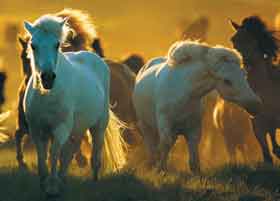
Horses Understand Humans
Horses inherently understand people better than most other animals do, displaying tremendous sensitivity to even the most subtle eye and body movements, new research suggests.
According to the study, published in the latest issue of Animal Behaviour, horses are able to decipher certain types of human-given visual and auditory cues.
Dogs, however, appear to be far more adept than any other species at figuring out what we are trying to communicate, especially when we're attempting to direct an animal's attention to an external object.
The reverse “Dr. Doolittle” phenomenon — how well animals understand us — seems to be tied to two factors: domestication and an animal's predisposition to how we communicate.
“Dogs do tend to have a much closer relationship with man and have probably been bred for their ability to pick up on human cues more so than horses,” lead author Leanne Proops told Discovery News. “Also, the cues humans give horses are often given while riding them, and therefore are of a different type and are not given face-to-face.”
Proops, a researcher in the Psychology Department at the University of Sussex, and colleagues Meggen Walton and Karen McComb tried five different ways of getting horses to investigate an empty bucket. If the horse got it right, a piece of carrot was dropped into the bucket.
The five ways included placing a striped wooden marker in front of the particular bucket; pointing at the bucket; tapping on the side of it; gazing at it; and having a person face in the direction of the bucket. The 34 horses that participated in the study understood the pointing and markers, but flunked all the rest.
“The overall pattern of responding suggests that horses may use cues that provide stimulus enhancement at the time of choice and do not have an understanding of the communicative nature of the cues given,” the researchers concluded.
With enough training, Proops thinks horses could ace all of the tests, but dogs don't seem to need this extra tutoring.
Surprisingly, our closest living relatives, chimpanzees, also sometimes do poorly on related tests, yet it's suspected they might have not been motivated enough to pay sufficient attention.
“Primates that have had extensive experience with humans tend to perform as well as dogs (on such tests),” said Proops.
The researchers theorize that the way we've domesticated horses has affected, in part, how they respond to us now.
In the past, horses were mostly valued for their size, beauty, strength and other qualities not always associated with behavior. Dogs, while bred for these traits too, were also selected for companionship characteristics.
Depending on how horses are domesticated and trained in future, they may have the potential to catch up with dogs as being man's best understanding friend.
